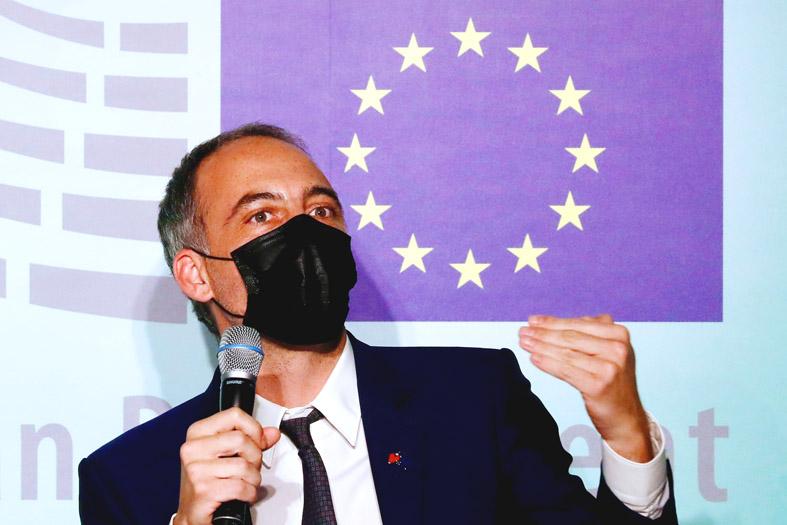The head of a European Parliament delegation that visited Taiwan last week said there is now a consensus among European political factions that cooperating with Taiwan is important for the bloc, and that he would continue to push for closer bilateral ties.
The delegation, which visited from Wednesday to Friday, comprised members of the European Parliament’s Special Committee on Foreign Interference in all Democratic Processes in the EU, including Disinformation (INGE).
In an interview with French media outlet La Liberation in Taipei on Thursday, INGE President Raphael Glucksmann, who led the delegation, said that the visit was kept low-key before the delegation departed, as the delegates did not want opposition from Beijing to muddle the focus of the visit or put improper pressure on the European Commission.

Photo: Ritchie B. Tongo, EPA-EFE
Although it was not the first time that European Parliament members have visited Taiwan, it was the first official delegation sent by the European Parliament, Glucksmann said.
In the past, there was no consensus on organizing an official delegation to Taiwan, he said, but now, people of different political factions have realized how important it is for Europe to cooperate with Taiwan, which is why the European Parliament decided to send a delegation.
Now that the first trip has been successful, a door has been opened, he said, expressing hope that such visits would become the norm and become more frequent.
During the visit, Glucksmann said that he was impressed by Taiwan’s inclusion of think tanks, non-governmental organizations and journalists in its whole-society approach to combating disinformation, as well as how Taiwan has managed to grow more open in the face of foreign threats.
Asked how supporting Taiwan benefits the EU, Glucksmann said that supporting democracies against authoritarian regimes is in the long-term interest of the EU and is an issue of principle.
If Europe does not take action, Beijing’s appetite will grow, he said, adding that history has shown that conceding to authoritarian and expansionist countries makes them increasingly hard to keep in check.
Although Europe cannot guarantee the safety of Taiwan, it can create a space where Taiwan is not isolated through exchanges in academia, culture and trade, he said.
Such engagements have prompted China to accuse Europe of causing regional instability, but these accusations are false, because cross-strait tension was high before Europe took action in support of Taiwan, Glucksmann said.
It is also because of China’s aggression that Europe has stepped up its cooperation with Taiwan, he added.
Glucksmann said that he would continue to push for closer ties between the EU and Taiwan, and advocate for a bilateral investment agreement.

A magnitude 5.6 earthquake struck off the coast of Yilan County at 12:37pm today, with clear shaking felt across much of northern Taiwan. There were no immediate reports of damage. The epicenter of the quake was 16.9km east-southeast of Yilan County Hall offshore at a depth of 66.8km, Central Weather Administration (CWA) data showed. The maximum intensity registered at a 4 in Yilan County’s Nanao Township (南澳) on Taiwan’s seven-tier scale. Other parts of Yilan, as well as certain areas of Hualien County, Taipei, New Taipei City, Taoyuan, Hsinchu County, Taichung and Miaoli County, recorded intensities of 3. Residents of Yilan County and Taipei received

Taiwan has secured another breakthrough in fruit exports, with jujubes, dragon fruit and lychees approved for shipment to the EU, the Ministry of Agriculture said yesterday. The Animal and Plant Health Inspection Agency on Thursday received formal notification of the approval from the EU, the ministry said, adding that the decision was expected to expand Taiwanese fruit producers’ access to high-end European markets. Taiwan exported 126 tonnes of lychees last year, valued at US$1.48 million, with Japan accounting for 102 tonnes. Other export destinations included New Zealand, Hong Kong, the US and Australia, ministry data showed. Jujube exports totaled 103 tonnes, valued at

TRUST: The KMT said it respected the US’ timing and considerations, and hoped it would continue to honor its commitments to helping Taiwan bolster its defenses and deterrence US President Donald Trump is delaying a multibillion-dollar arms sale to Taiwan to ensure his visit to Beijing is successful, a New York Times report said. The weapons sales package has stalled in the US Department of State, the report said, citing US officials it did not identify. The White House has told agencies not to push forward ahead of Trump’s meeting with Chinese President Xi Jinping (習近平), it said. The two last month held a phone call to discuss trade and geopolitical flashpoints ahead of the summit. Xi raised the Taiwan issue and urged the US to handle arms sales to

BIG SPENDERS: Foreign investors bought the most Taiwan equities since 2005, signaling confidence that an AI boom would continue to benefit chipmakers Taiwan Semiconductor Manufacturing Co’s (TSMC, 台積電) market capitalization swelled to US$2 trillion for the first time following a 4.25 percent rally in its American depositary receipts (ADR) overnight, putting the world’s biggest contract chipmaker sixth on the list of the world’s biggest companies by market capitalization, just behind Amazon.com Inc. The site CompaniesMarketcap.com ranked TSMC ahead of Saudi Aramco and Meta Platforms Inc. The Taiwanese company’s ADRs on Tuesday surged to US$385.75 on the New York Stock Exchange, as strong demand for artificial intelligence (AI) applications led to chip supply constraints and boost revenue growth to record-breaking levels. Each TSMC ADR represents